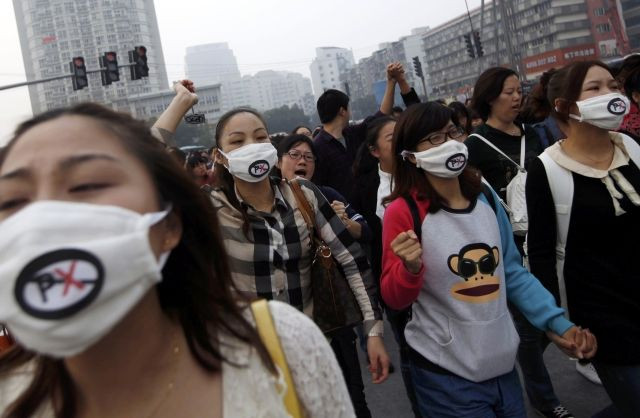Chinese Protests Over Chemical Factory Reflect Government Mistrust

The standoff in the eastern Chinese city of Ningbo continued for the fourth day Monday, even after the local government cancelled plans to expand a petrochemical complex, giving in to the protestors’ demand, news agencies reported.
The Ningbo city government announced Sunday evening that they and the project's investor — the state-owned petrochemical company Sinopec — had "resolutely" agreed not to go ahead with the expansion, China News Service said.
The sporadic demonstrations that began last week grew into a full-blown protest over the weekend with thousands of citizens joining in, leading to clashes between protesters and the police. The residents objected to the construction of a paraxylene facility at the plant.
Protesters including the elderly and children as well as some socially conscious pet poodles marched the streets of the city to register objection shouting slogans like "Protect Ningbo" and "Return my health."
Ningbo's Communist Party chief Wang Huizhong and Mayor Liu Qi reportedly held discussions with residents of the city’s Zhenhai district Saturday night.
The protests, over the planned expansion of the Ningbo Petrochemical Economic and Technical Development Zone in the Zhenhai District with a combined investment of nearly 55.8 billion yuan ($8.8 billion) is the latest this year as residents fear health risks from severe environmental pollution.
A research comparing cancer statistics of 2009 with the data of the previous two years had indicated that malignant tumors were the main cause of death in the Zhenhai district.
The local administration said Sunday that refining at the factory would stop for the time being while a scientific review is conducted.
Plans to build a paraxylene plant in the northeastern port of Dalian were also cancelled in August last year following mass protests.
Chinese newspaper commentaries on the issue highlighted the underlying mistrust of the people in the government.
"The rapid rise in the number of environmental protests points to two conflicting tendencies: citizens' awakening environmental awareness and some local authorities' obsession with economic growth, even if it comes at the cost of the environment,” China Daily wrote.
“The conflicts that have arisen between residents and local governments, some of which have even developed into riots, show that some local leaders still need to acquaint themselves with the notion that residents' right to a healthy environment must be adequately respected,” the newspaper said.
The editorial in Global Times, run by Communist Party’s People’s Daily, sided with the government saying that “protests need to be prevented from influencing the projects already under operation.”
“China's growing middle class has a strong awareness of environmental protection and is growingly increasingly concerned about their immediate interests. The establishment of heavy chemical projects has reached a deadlock,” it said, referring to recurring protests similar to that at Ningbo.
“The protests against chemical projects are not political in nature. Therefore, when setting up new regulations, the authorities should pay enough attention to compensation for locals. As long as their interests are properly protected, public attitudes toward heavy chemical programs will change,” the Global Times said.
© Copyright IBTimes 2024. All rights reserved.






















